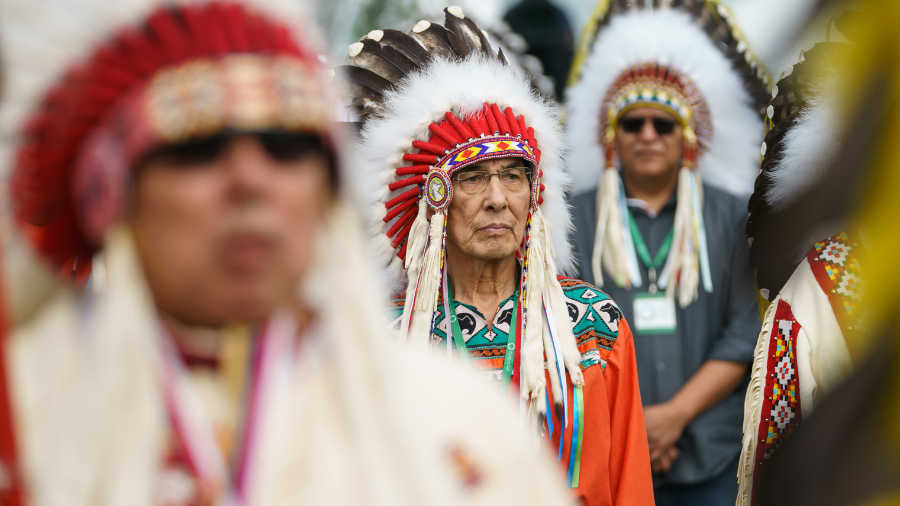By Melissa Mbarki, September 30, 2022
There was a moment before the Pope’s speech that made me pause. I did not know what to expect but witnessing the Pope walk alongside Indigenous leaders was a first for me. This has never happened before and, for a brief second, I felt hope.
We were witnessing old traditions meeting a new era. A new era of hope, resilience and healing.
In order to heal, the trauma these residential schools caused must be acknowledged. I was a child when the Muskowekwan residential school was operating in my community. Many of my classmates were abused in this school.
We learned about death at a young age. Residential school students did not return to class because they committed suicide or were involved in tragic accidents. These were not easy conversations for my mom or our teachers to have with us.
I asked myself if an apology was enough. Would this apology resonate with families who lost their children or survivors today? I had very mixed feelings about it all.
The Pope acknowledged the apology was re-traumatizing for many: “To remember the devastating experiences that took place in the residential schools hurts, angers, causes pain, and yet it is necessary.” Many of the survivors in the crowd are now elders in our communities and the sadness in their eyes tell that story of pain and anger.
This is where the apology started to resonate with me:
Again, I think back on the stories you told: how the policies of assimilation ended up systematically marginalizing the Indigenous Peoples; how also through the system of residential schools your languages and cultures were denigrated and suppressed; how children suffered physical, verbal, psychological and spiritual abuse; how they were taken away from their homes at a young age, and how that indelibly affected relationships between parents and children, grandparents and grandchildren.
These schools were designed for assimilation. If education was the priority, Indigenous people would have the highest number of graduates in this country. Sadly, this isn’t so and many received nothing more than a grade six education when they departed.
Children who left these schools did not have an education, did not have basic life skills, nor did they have the cultural knowledge that would have been handed down from their parents and grandparents. What they did come home with was Post-Traumatic Stress Disorder.
One thing that is rarely talked about are the psychological harms that residential schoolchildren went home with. Indigenous communities were not equipped with the resources to help their children and we still are not today. Why was it ok to uproot children from their families and return them with no support systems in place?
Would the Canadian Army send a veteran home with no mental and physical supports in place? No. Yet this is what happened to Indigenous peoples all around the country.
The Pope acknowledged the harms and for me this is the first step in healing and reconciliation. What needs to happen after the apology is to fast track policing, addictions and mental health services to the reserves. Many of these initiatives are caught in red tape and will take years if not decades to build.
Partnerships are important. The Canadian government, the Catholic Church and Indigenous leaders must come together and start working on tangible support systems that are lacking in our communities. It’s not an option today, it’s a necessity.
Addictions and crimes are overwhelming our communities. We are still dealing with the trauma left from residential schools today and will continue to do so if we don’t get some help. I will continue to advocate for these resources until every community has access to them.
Melissa Mbarki is a Policy Analyst and Outreach Coordinator for the Indigenous Affairs Program at the Macdonald-Laurier Institute, and a member of the Treaty 4 nation in Saskatchewan.






